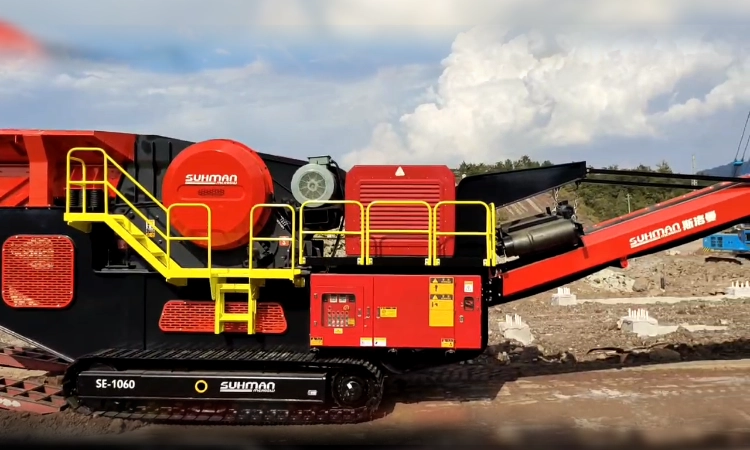How Does a Jaw Crusher Work?
Release time: 2025-03-09
Jaw crushers are essential equipment in industries like mining, construction, and recycling, designed to break down large rocks and materials into smaller, manageable sizes. If you’ve ever wondered, "How Does a Jaw Crusher Work?", this article will dive deep into its working principles, structure, types, applications, advantages, and maintenance tips. With a detailed breakdown and practical insights, you’ll gain a comprehensive understanding of this powerful machine.
Table of Contents
- Introduction
- The Working Principle of a Jaw Crusher
- Structure of a Jaw Crusher
- Types of Jaw Crushers
- Applications of Jaw Crushers
- Advantages of Jaw Crushers
- Maintenance Tips for Jaw Crushers
- Comparison Table: Types of Jaw Crushers
- Conclusion
Introduction
In the world of material processing, jaw crushers stand out as robust and reliable machines. They are widely used to crush hard materials like rocks, ores, and concrete, making them indispensable in industries such as mining, quarrying, and construction. But how exactly do they work? This article will explore the mechanics behind jaw crushers, their components, and why they remain a top choice for crushing tasks. Whether you’re considering a Mobile Jaw Crusher for Hard Rock or a compact Efficient Mini Modular Jaw Crusher, understanding their operation is key to selecting the right equipment.

The Working Principle of a Jaw Crusher
At its core, a jaw crusher operates by compressing materials between two plates: a fixed jaw and a movable jaw. Here’s how it works:
- Material Feeding: Large rocks or materials are fed into the crusher’s chamber through the top opening, known as the "gape."
- Compression Process: The movable jaw, driven by an eccentric shaft and motor, swings back and forth. As it moves toward the fixed jaw, it crushes the material against it.
- Discharge: Once crushed to the desired size, the material exits through the bottom opening, called the "discharge gap," which can be adjusted to control output size.
This simple yet effective mechanism relies on the relative motion of the jaws, making jaw crushers ideal for primary crushing tasks. The Mobile Jaw Crusher Plus with Powerful Crushing Ability exemplifies this principle, delivering exceptional performance for tough materials.
Structure of a Jaw Crusher
A jaw crusher’s efficiency depends on its well-designed components. Here’s a breakdown of its key parts:
- Frame: The sturdy base that supports all components, typically made of cast iron or steel.
- Fixed Jaw Plate: The stationary surface against which materials are crushed.
- Movable Jaw Plate: The swinging jaw that applies pressure to break down materials.
- Eccentric Shaft: Connects to the motor and drives the movable jaw’s motion.
- Toggle Plate: Protects the crusher by acting as a safety mechanism, breaking under excessive load.
- Flywheel: Stores energy and ensures smooth operation.
These components work in harmony to deliver consistent crushing power, whether in a stationary unit or a Mobile Crushing and Screening Integrated Machine.
Types of Jaw Crushers
Jaw crushers come in various designs, each suited to specific needs:
1. Single Toggle Jaw Crusher
Features a single toggle plate that assists the movable jaw’s motion. It’s simpler, lighter, and ideal for smaller-scale operations.
2. Double Toggle Jaw Crusher
Uses two toggle plates for enhanced stability and force, making it suitable for heavy-duty crushing of hard materials.
Modern variations, like the Efficient Mini Modular Jaw Crusher, offer modular designs for easy transport and setup.
Applications of Jaw Crushers
Jaw crushers are versatile machines with applications across multiple industries:
- Mining: Crushing ores like gold, copper, and iron for further processing.
- Construction: Breaking down concrete and rocks for aggregates.
- Recycling: Processing demolished materials into reusable gravel.
- Quarrying: Producing crushed stone for roads and buildings.
For challenging environments, the Mobile Jaw Crusher for Hard Rock excels at handling tough, abrasive materials.
Advantages of Jaw Crushers
Why choose a jaw crusher? Here are its key benefits:
- High Efficiency: Processes large volumes quickly.
- Reliability: Durable design withstands harsh conditions.
- Versatility: Handles various materials, from soft limestone to hard granite.
- Cost-Effectiveness: Low operational costs and minimal maintenance.
These advantages make jaw crushers, such as the Efficient Mini Modular Jaw Crusher, a smart investment for businesses.
Maintenance Tips for Jaw Crushers
To ensure longevity and performance, regular maintenance is crucial:
- Inspection: Check jaw plates and toggle plates for wear daily.
- Lubrication: Grease bearings and moving parts to reduce friction.
- Cleaning: Remove debris from the chamber to prevent blockages.
- Adjustment: Periodically adjust the discharge gap for consistent output.
Proper care extends the life of both stationary and mobile units, like the Mobile Jaw Crusher Plus with Powerful Crushing Ability.
Comparison Table: Types of Jaw Crushers
| Type | Mechanism | Best For | Advantages | Disadvantages |
|---|---|---|---|---|
| Single Toggle | One toggle plate | Light to medium duty | Simple, lightweight | Less force for hard materials |
| Double Toggle | Two toggle plates | Heavy duty | Stable, powerful | More complex, heavier |
Conclusion
Understanding "How Does a Jaw Crusher Work?" reveals why it’s a cornerstone of material processing. From its straightforward compression mechanism to its robust structure, the jaw crusher offers unmatched efficiency and reliability. Whether you’re in mining, construction, or recycling, choosing the right model—like the Mobile Multi Cylinder Cone Crusher for enhanced capacity—can boost productivity. Explore our range of crushers at Suhman Crusher to find the perfect solution for your needs.






